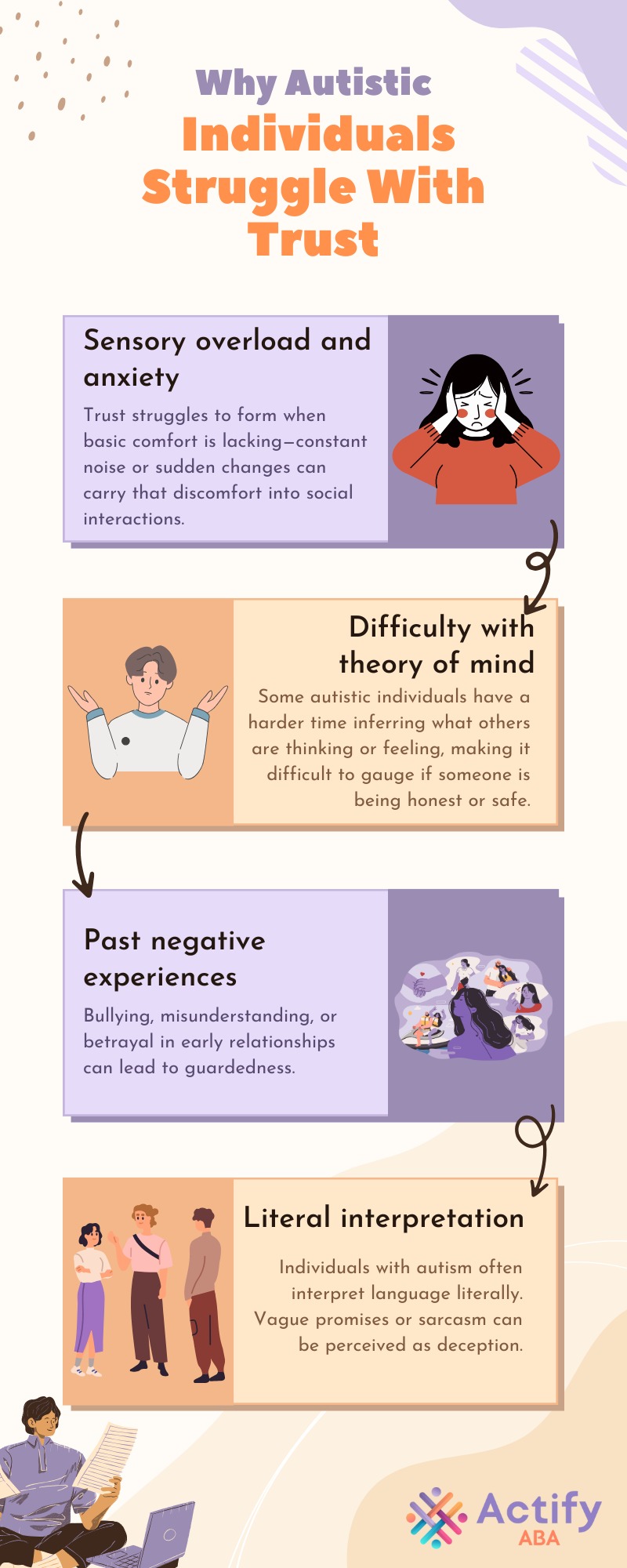
Key Points:
- Many autistic individuals face unique challenges when it comes to trust, especially in relationships that require emotional reciprocity.
- Sensory sensitivities, communication differences, and past negative experiences can all contribute to struggles with trust.
- Practical strategies for caregivers and loved ones can help build authentic, lasting trust through predictability, empathy, and consistent support.
Establishing trust can be complex in any relationship, but when autism is involved, the process often becomes even more layered. Autism and trust issues are deeply connected due to how neurodivergent individuals perceive and respond to social cues, communication, and vulnerability.
According to research, approximately 50% of individuals with autism struggle with social anxiety, making it increasingly important for parents and caregivers to understand how trust is formed differently in the autistic brain. This article explores why trust can be difficult to develop and maintain and offers strategies for supporting individuals with autism in meaningful relationships.
What Is the Connection Between Autism and Trust Issues?
Autism and trust issues are often intertwined due to communication barriers, sensory sensitivities, and inconsistent social feedback. These factors can make it difficult for autistic individuals to predict others’ intentions, leading to reluctance in forming or deepening relationships.
For many individuals with autism, trust is not given freely; it is earned through consistent, clear, and respectful interaction. Unlike neurotypical individuals, autistic people may not instinctively pick up on nonverbal cues or implied meaning, leading to misunderstandings and misinterpretations. This disconnect can create cycles of mistrust that are hard to break without intentional effort.
Why Is Trust Difficult to Build for Autistic Individuals?
Trust doesn’t come easily when the world feels unpredictable or overwhelming. Many autistic individuals struggle with interpreting the intentions of others, not due to a lack of desire but because their neurological processing differs from societal norms. This can result in difficulty forming close relationships, even with family members.
Before we explore solutions, it’s essential to understand some of the core reasons autistic individuals may struggle with trust:

Why Is Early Intervention Important for Trust Development?
The earlier a child receives support tailored to their neurodiverse needs, the better their outcomes in communication, behavior regulation, and relational trust. Trust is not just a feeling—it’s a skill that can be nurtured through consistent practice and repetition, especially when started young.
Early intervention provides children with predictable, supportive environments where they can safely explore relationships and learn that adults can be reliable and responsive. These early positive interactions lay the foundation for secure attachment, making it easier for the child to build trusting relationships with peers, educators, and caregivers as they grow.
How Can You Build Trust With Someone Who Has Autism?
Building trust with someone on the autism spectrum takes time, intention, and consistency. You can’t rush it or fake it. Instead, focus on the aspects of connection that matter most to the autistic individual.
After laying the foundation, these strategies can help maintain and deepen trust over time:
1. Consistency Is Key
Predictable behavior and routines reduce anxiety and build trust. Sudden changes can feel like betrayal, making it harder for the child to feel safe and secure.
2. Respect Boundaries
Autistic individuals often need more personal space, time to decompress, or specific ways of communicating. Honoring this signals that you are safe, respectful, and attentive to their needs.
3. Be Clear and Literal
Avoid ambiguous language or implied meanings. Say what you mean directly to avoid confusion and frustration. This clarity fosters a sense of emotional safety and predictability.
4. Follow Through on Promises
Broken promises are particularly damaging for individuals with autism, who may already be unsure whether to trust others. Consistently keeping your word builds reliability and strengthens the relationship.
5. Ask for Feedback
Check in regularly and invite honest input. Asking if they’re comfortable or if there’s a better way to communicate promotes mutual understanding and empowers the individual.
How Do Autism Traits Affect Relationship Dynamics?
Traits commonly associated with autism can reshape how individuals interact within relationships, including family ties, friendships, and romantic partnerships. Recognizing these differences can help parents and caregivers adjust expectations and communication styles.
Autistic individuals may appear emotionally distant, not because they don’t care, but because they express affection or attachment differently. Eye contact, verbal affirmations, and social rituals may not carry the same weight, or may be experienced as uncomfortable.
Common traits that influence relationships include:
- Preference for routine: Changes in relational dynamics (e.g., a new sibling or moving homes) may be particularly stressful.
- Selective interest: Deep focus on specific topics can make reciprocal conversations harder if others don’t share those interests.
- Social fatigue: After social interaction, many autistic individuals require time alone to recharge, which can be mistaken for withdrawal.

What Role Does Communication Play in Building Trust?
Communication is a central pillar of any trusting relationship. For autistic individuals, however, traditional communication strategies may not work. Adjusting the way you speak, listen, and respond can make all the difference.
Many individuals with autism are more responsive to visual or written communication than spoken conversation. Some may use alternative communication devices. Understanding and validating their preferred method shows respect and reduces pressure.
Communication tips that support trust include:
1. Use Simple, Direct Language
Avoid idioms, sarcasm, or jokes that rely on hidden meanings. Clear communication helps prevent misunderstandings and builds confidence in conversations.
2. Practice Active Listening
Don’t interrupt, and give your full attention when they speak. Reflect back what was said to confirm understanding and show that their words matter.
3. Allow Processing Time
Wait patiently after asking a question or giving directions. Silence doesn’t always mean refusal—it might mean they’re still thinking or formulating a response.
4. Use Visual Tools
Schedules, social stories, and emotion cards help clarify intentions and expectations. Visual supports can reduce anxiety and improve comprehension.
5. Validate Their Feelings
Even if a reaction seems exaggerated to you, respond empathetically. Acknowledging emotions builds trust and shows respect for their experience.
What Breaks Trust for Those Diagnosed with Autism
Even with the best intentions, trust can be lost or weakened. For autistic individuals, this often happens when communication breaks down or when their autonomy isn’t respected. Unlike neurotypical breakdowns, these can take longer to recover from.
When someone with autism begins to withdraw or becomes less responsive, it may be a sign that their trust has been damaged. It’s important not to react with frustration or guilt-tripping but to instead take a step back and evaluate what may have caused discomfort.
Some common triggers for loss of trust include:
- Inconsistency in routines or promises
- Unwanted physical contact or sudden changes
- Dismissal of sensory needs or emotional states
- Forcing eye contact or traditional social expectations
- Punishing meltdowns without understanding the root cause
How Can Parents Help Their Autistic Child Develop Trust?
Parents play a critical role in shaping how their child understands and forms trusting relationships. By creating a home environment that is both structured and emotionally safe, you foster a base for your child to explore social interaction with more confidence.
This includes being mindful of how you respond to stress, respecting your child’s cues, and modeling transparent communication. Partnering with professionals, such as ABA therapists, can also help reinforce positive behaviors and create a consistent support system.
Key steps that can help build trust include:
1. Maintain Predictable Routines
Maintaining predictable routines, especially during transitions, helps create a sense of safety and stability. Familiar patterns reduce stress and give children a framework they can rely on throughout the day.
2. Prepare for Change
Preparing your child for changes with visual cues, countdowns, or social stories allows them time to adjust. This advance notice reduces anxiety and promotes smoother transitions.
3. Minimize Surprises
Minimizing surprises is important, especially if they aren’t clearly positive or expected. Predictability helps children feel in control and reduces emotional overwhelm.
4. Celebrate Trust Milestones
Celebrating small trust milestones—like initiating a hug or sharing a toy—reinforces progress in a meaningful way. Positive reinforcement encourages continued connection and emotional growth.
5. Support Social Growth Gently
Encouraging social interaction without forcing it respects the child’s comfort level. Gentle support helps them build confidence and engage at their own pace.
6. Work with a Support Team
Collaborating with professionals such as therapists or teachers ensures consistency across environments. A united approach reinforces safe, healthy habits and supports lasting trust—especially when navigating challenges like attention regulation or goal-setting. For a deeper look at how these issues differ between conditions, explore Executive Dysfunction in Autism vs ADHD: Key Differences.
Support Your Child with ABA Therapy in Maryland
If your child struggles with trust, connection, or understanding social cues, professional support can make a meaningful difference. Actify’s ABA therapy in Maryland can help teach vital life skills, including emotional regulation, communication, and social interaction—all of which are foundational for building trust.
Whether your child is newly diagnosed or has been on this journey for years, Actify provides tailored services to meet them where they are, fostering growth in a safe and consistent environment.
Contact us today to learn how we can help your child build meaningful relationships grounded in trust and understanding!
